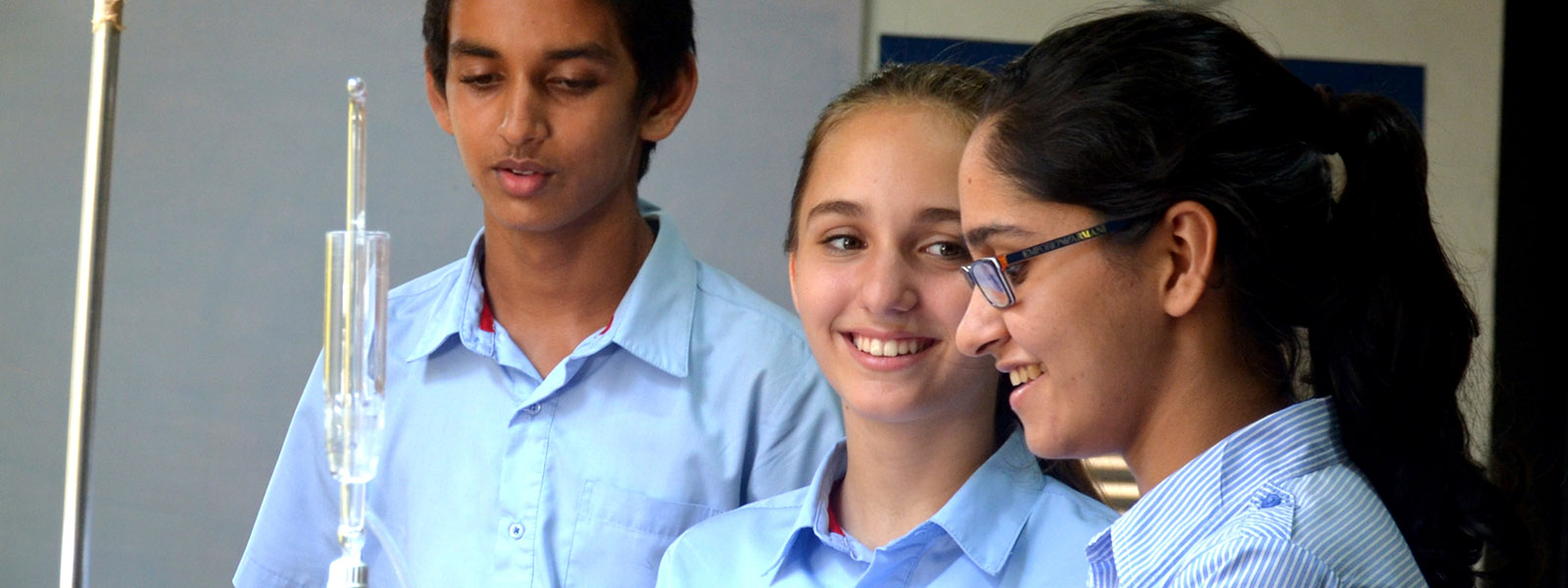
Curriculum
Elizabeth Moir School has a progressive international curriculum that blends new and innovative approaches to learning with a traditional focus on basic skills such as grammar and arithmetic. We recognise the central importance of students learning key skills they will need later in life but also that school should still involve learning facts, and aim to retain the best of both conventional and modern practice. The curriculum is regularly updated to stimulate students’ interest by exposure to the latest cutting-edge developments in each subject, from Artificial Intelligence in ICT to Climate Change in Geography.
Junior School
The Junior School uses British textbooks for Mathematics and English. Literacy and Numeracy are the main focus of the curriculum throughout the school. Art, Music & Movement, Drama and PE are a formal part of the curriculum throughout the school, while Swimming classes begin in KG1.
Where appropriate, the school uses cross-curricular techniques when studying various topics. In KG1 and KG2, these topics take place in Environmental Studies, and for Junior 1 – Junior 3 in General Knowledge. Junior 4 and Junior 5 study History and Geography separately. Current topics include: People Who Help Us, Dinosaurs, Planet Earth, Civil Rights, Ancient China, The Vikings, The Rainforest, Birds and Ancient Egypt
Senior School
The Senior School follows British syllabuses that are adapted to the school’s Sri Lankan context. Students gain the knowledge they need to compete in the fast-changing 21st century global village without neglecting the customs and heritage of the country they live in. Using examples and case studies from Sri Lanka and other Asian countries in Geography, for example, ensures that the students can see how what they learn is relevant to their own lives.
In the Arts, we nurture and encourage students’ originality, creativity and free thinking, like the top British schools. In Mathematics, Science and Technology, however, we appreciate that standards are now often higher in India, China, Japan and Korea and ensure we keep ahead of the latest advances in these countries.
Forms 1-3
Coming to the Senior School involves lots of exciting changes for our students. Students have the chance to do experiments in fully-equipped Science laboratories and learn the basic scientific method while learning about the wonders of the world around them. In English, while there is still a strong emphasis on basic writing skills, students also have their first taste of Literature, studying texts as diverse as Othello by Shakespeare and To Kill a Mockingbird by Harper Lee. Rather than studying English Kings and Queens in History, students study topics more relevant to them, including the Holocaust and the Arab-Israeli conflict.
In addition to English, Mathematics, Science, History, Geography and ICT, students in Forms 1-3 also have the choice of starting to learn French, Sinhala or Tamil. They also attend PE, Swimming and Art classes as part of their curriculum.
Forms 4 & 5
In Form 4, students begin the IGCSE course set by Edexcel, the examining body that includes the former London Examinations. IGCSE is recognised by universities and employers around the world and students’ results in this examination are the first step to university admission. The course lasts two years with students taking the examinations at the end of Form 5.
English Language and Mathematics are compulsory for all students. Students must choose at least six more subjects from the following list: Further Pure Mathematics, English Literature, Physics, Chemistry, Biology and Human Biology, History, Geography, ICT, French, Sinhala, Tamil and Art.
6th Form
6th Form students study the GCE Advanced (A Level) course set by Edexcel. These qualifications are recognised by universities in Britain, the USA, Australia, Singapore, Malaysia, India, Canada, and elsewhere.
Students must select 3 or 4 subjects from: Mathematics, Further Mathematics, Physics, Chemistry, Biology, History, English Literature, Geography and Economics.
These are the core academic subjects recognised as being most academically rigorous by top universities. Most British universities now have lists of ‘non-preferred’ subjects including Commerce, Accounts, Psychology and Law. Students who take one of these subjects are at a disadvantage, when applying, and students who take two are not even considered, so this is why we do not offer them.
Please click here to download the school’s handbooks with more details on the IGCSE and A Level courses.